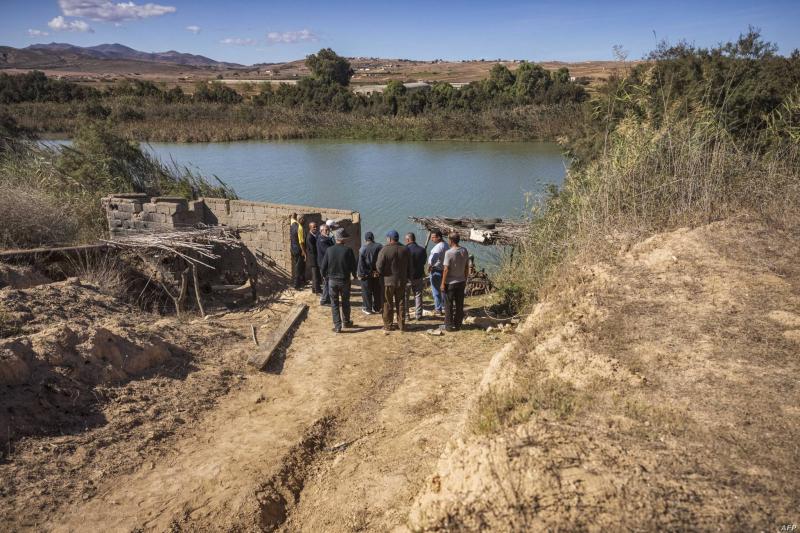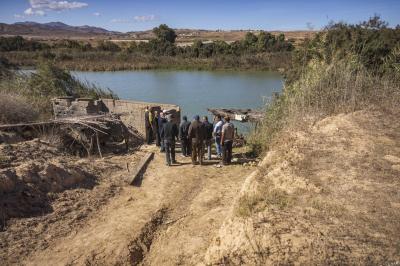The waters of the Moulouya River, one of Morocco's largest rivers, have dried up to the point where it is unable to reach its mouth in the Mediterranean Sea, "for the first time in its history," according to environmental expert Mohamed Benatta to "France Presse." This situation threatens agricultural lands and biodiversity in the region. The reasons for this "tragic phenomenon" are attributed to a decrease in the river's flow due to excessive consumption of its water, explains the retired expert while taking photos near the mouth of the river close to the tourist city of Saidia in the northeast of the kingdom near the border with Algeria.
The harshness of drought has disrupted the ecological balance in this agricultural area, with salty seawater invading the river's course "over a distance of 15 kilometers," forcing farmers on both banks to abandon their fields due to water salinity and its impact on the soil. In one of the farms on the left bank of the river, the watermelon fruits appear pale yellow and deformed on dry stalks, "that even pigs would refuse to eat," laments local farmer Ahmed Hadioui. This 46-year-old farmer spent around $33,000 this year on cultivating his fields and using two water pumps to irrigate the watermelons, "but everything evaporated due to the lack of rain and especially the salinity of the river's water." The salinity reaches up to seven grams per liter, while freshwater salinity should not exceed 0.5 grams per liter.
Morocco, where agriculture is the main sector of its economy, has faced consecutive drought seasons in recent years. It is expected that the situation will worsen by 2050 due to a decrease in rainfall (-11 percent) and an increase in temperatures (+1.3 degrees), according to a report from the Ministry of Agriculture.
A "Fatal Blow"
Hadioui's cousin has also given up hope of harvesting the artichokes grown in a nearby field as the green of their weeds has faded, stating, "I haven't tasted the sweetness of irrigation water for two months due to water scarcity, and I avoid using the river's water lest its salinity ruin the soil for years," says his companion Mustafa. Mustafa abandoned his teaching profession to work in agriculture, only to be forced to relinquish two-thirds of his 57-hectare farm due to drought. In addition to the harshness of nature, Hadioui and most of the farmers in the area who spoke to France Presse also blame "poor management" of the river's water and its excessive exploitation through two pumping stations and three dams in the region.
Despite the fact that the second pumping station has only been operational for six months, Hadioui states, "It has been a fatal blow for farmers of the lower Moulouya basin." The priority for irrigation water is given to fruit tree farms located far from the river's mouth, which represents an "unequal distribution" in the eyes of farmer Abdel Rahim Zakhni, 61. He has also been forced to stop farming his family estate that spans 200 hectares. However, the regional director of the Ministry of Agriculture, Mohamed Bousfo, clarifies that prioritizing the irrigation of trees "is due to the exceptional circumstances we are living in," noting that reviving a dead tree is harder than replacing a vegetable field. He emphasizes that the main reasons for the lack of river water are drought and salinity, stating, "The two pumping stations do not have a significant impact on its flow, and studies were conducted prior to their establishment to avoid any imbalance in the river."
"From Bad to Worse"
The Ministry of Agriculture's forecasts indicate that drought will lead to a decline in irrigation water supplies by 2050, "to a level that could reach up to 25 percent" nationally. Farmers in the Moulouya area fear the impact of these environmental changes on their livelihoods. Zakhni expresses his despair for the future, saying, "What saddens me most is that my children will have to work far away on other farms, even though we have our own land."
The situation is no better on the right bank of the Moulouya River, which extends about 500 kilometers from the Middle Atlas Mountains. Farmer Samir Choudna states, "We have plowed this land for generations, but the situation today is getting worse." The young farmer adds, "The youth of the region currently think only of emigration."
On another note, environmental activist Mohamed Benatta warns of an environmental disaster threatening the natural reserve at the river's mouth, which is the most important in the eastern region, cautioning that "wild animals and plants will not emerge unscathed."




